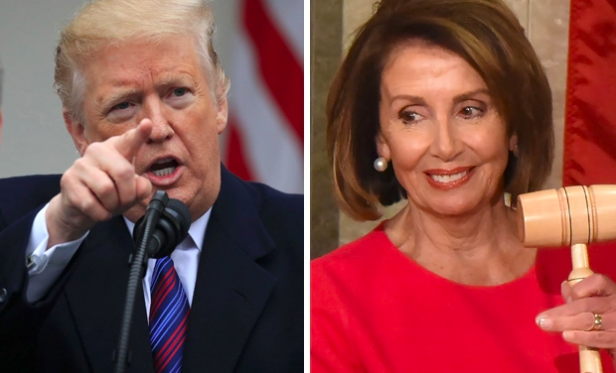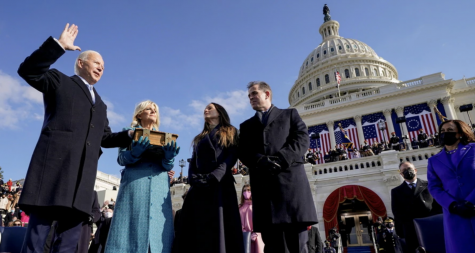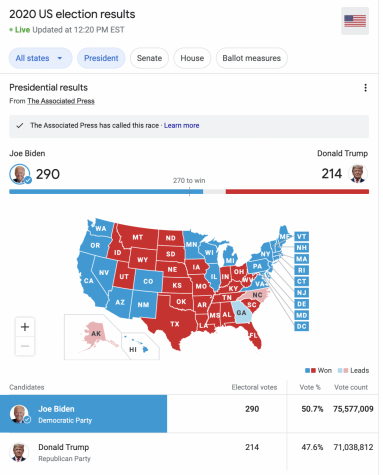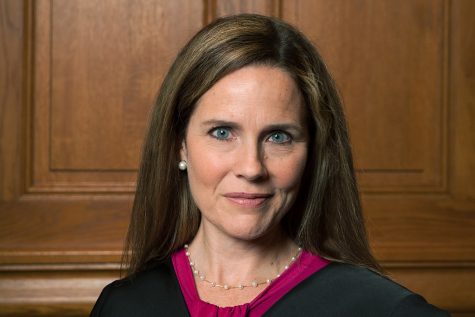The Impeachment Debate
De Moraes, Lisa. “Donald Trump Dares Nancy Pelosi To Keep Him Out Of House For SOTU.” Donald Trump Dares Nancy Pelosi To Keep Him Out Of House For SOTU, DEADLINE, 23 Jan. 2019, deadline.com/2019/01/donald-trump-dares-nancy-pelosi-sotu-house-chamber-letter-1202540165/.
El presidente Donald Trump (izquierda) y portavoz de la Cámara Nancy Pelosi (derecha)
March 10, 2020
The Legal Merits of Impeachment
By Andrew McKenzie
There will always be the greatest danger that the decision will be regulated more by the comparative strength of parties, than by the real demonstrations of innocence or guilt.
— Alexander Hamilton, Federalist no. 65
On December 18th of 2019, Speaker of the House, Nancy Pelosi, along with fellow Democrats in the House of Representatives, put forth articles of impeachment against President Donald John Trump for “abuse of power” and “high crimes and misdemeanors.” The origin of this indictment came from a conversation between President Trump and the President of Ukraine, Volodymyr Zelensky. Democrats claimed that this phone call was a clear example of a quid pro quo, in which President Trump committed a crime by withholding aid from Ukraine unless they investigated the son of Joe Biden, a political rival of Trump’s. Republicans said that this phone call was not an indication of any such thing occurring. The fact of the matter is that this phone call was a political Rorschach test in which politicians and public alike chose to hear what they wanted to. For this reason, it’s not worth discussing the accusation of a quid pro quo without looking at the legality of the accusations itself.
The United States Constitution states, “The President, Vice President and all Civil Officers of the United States shall be removed from Office on Impeachment for, and Conviction of, Treason, Bribery, or other high Crimes and Misdemeanors.” (U.S. Constitution, Article II, section 4). The listed impeachable offenses of treason, bribery, or high crimes and misdemeanors are and were always intended to be interpreted as crimes recognized by the law. The Founders knew that if impeachable offenses were anything other than illegal acts the whole process would be in jeopardy of becoming a partisan ploy to smear future presidents. If high crimes and misdemeanors, as specifically delineated in the constitution, were subject to the majority of Congress’s opinion, it would mean that the legislative branch would be determining the meaning of the Constitution. That would thus mean that the legislature was above the Constitution, which would disrupt the balance of powers, and be wholly unconstitutional.
This idea runs contrary to statements like, “Impeachment is whatever Congress says it is. There is no law…” (rep. Maxine Waters) as well as the opinions of many legal scholars. This view of the process, that Congress has full control over the happenings of the executive branch, is deeply misinformed and could bring chaos to the legal system along with jeopardizing the validity of any future president with whom the majority of Congress disapproves. With this in mind, the first two of the offenses listed in the impeachment clause of the Constitution, treason and bribery, were offenses that the Founders knew would be considered illegal. So why, if they were listing future illegal acts, would they use a term such as “high crimes and misdemeanors”? The answer is that this too was meant to be understood as a legally recognized crime, and not whatever Congress says it is.
Elsewhere in the constitution, there are other rules for the executive branch that are listed which are not considered crimes, and thus the separation between those legal offenses and the criminal, impeachable offenses is the main proof that impeachment must always be based on a crime that currently exists in the law of the United States. It is for this reason that President Bill Clinton’s impeachment was legally valid, for he committed perjury, a legally recognized crime, making it an impeachable offense. As for the impeachment of President Trump, is it also valid? Are “abuse of power,” or the newly coined “obstruction of Congress” actual crimes?
To start with “abuse of power,” the answer is no. As previously discussed, the impeachable offenses must not be subject to the interpretation of Congress, and a term like “abuse of power” is the textbook definition of subjective. What one politician believes is excessive executive exercise, another may think is too little. Highly respected presidents like Teddy Roosevelt or Ronald Reagan would be seen by some of the Founders as being too active in their role as president and abusing their power. Subjective opinion cannot be the basis for legal decision, or else it fails to be objective justice.
As for the aforementioned “obstruction of congress,” that too is invalid. This concept is even more constitutionally and legally ironic because it is yet another subjective, circular argument. If the legislative branch, the branch that impeaches a president, can determine its own powers and determine what obstructs it, then it can define the terms of impeachment. This oversteps the Constitution. The judicial branch, which has the power to issue a subpoena, also has the power to judge the validity of such subpoenas, not the legislative branch. It is for this reason that “obstruction of Congress” is a nonexistent accusation, because Congress determining the validity of a subpoena, which is the job of the Judiciary, would be Congress overriding the definition of the Constitution, jeopardizing the legal code and the judicial branch. This is another example where the political whim of Congress could endanger an objective legal system.
Despite what one thinks about the rhetoric of the president or his proposals, both of which are reasonable and respectable complaints, he was elected, and he has not committed any crimes. It is the duty of all Americans to vote in or vote out presidents they disagree with at the ballot box. It is not the duty of Congress to do so with impeachment. This is not a left or right issue, this is a point in which all Americans must decide what we want for our legal future: a constitutional fairness, or partisan chaos.
______________________________________________________________________________________
The Impeachment of President Donald J. Trump
By: Teddi Carnesi
President Donald J. Trump has been impeached. The House of Representatives has approved articles of impeachment on charges of abuse of power and obstruction of congress. Based off of cold hard facts, not “fake news,” President Trump has used his considerable power in negative ways. Trump’s impeachment came about when a formal house inquiry found that he had solicited foreign interference in the 2020 U.S election to help his re-election bid. Trump also withheld military aid and an invitation to the White House to Ukarainian president, Volodymyr Zelensky in order to promote an investigation of Joe Biden, Trump’s political opponent. Based on these actions, I believe that Donald Trump demonstrates an extremely unconstitutional presidency.
President Trump’s actions regarding the impeachment are far from respectful. Trump has tweeted many un-presidential tweets discussing the impeachment such as, “Not the Senate’s job to mop up the mess made in the House by the Democrats. Biden admitted that he went to Ukraine and did the Quid Pro Quo.” Democrat, Adam Schiff, one of the lead investigators in the impeachment inquiry of Trump has recently made an appearance in Trump’s twitter account. Trump stated “Shifty Adam Schiff is a CORRUPT POLITICIAN, and probably a very sick man. He has not paid the price, yet, for what he has done to our Country!” It is extremely unfortunate that the United States is represented by a leader that has such poor manners and communication skills.
The United States is a country that represents people of all backgrounds. Currently, we have a president that is ignorant to the aspirations and needs of the people. Hopefully, in the 2020 election, the public body of the United States can finally regain their representation.






















